In honor of Poetry Month, we asked Tom Bowden to share reviews of his favorite poetry books from the past four years of arrogantly recommended columns. All links for books are to Bookshop.org an online ordering service that supports Indie Bookstores or direct from the publisher. Book Beat stocks most of these titles or can order them quickly for free pickup. Call us at (248) 968-1190 or write to: bookbeatorders@gmail.com Thank you for supporting Indie Bookstores!
 Seriously Well
Seriously Well
Helge Torvund
The Song Cave
This book-length poem considers the joys of reading, creating, and living—with a recently discovered tumor. Seriously Well is avowedly joyful and appreciative of the “enigmatic art” of writing—“signs / resembling tiny insects,” that “can make the outer world / and the inner imagination / meet.” Writing allows us
To be in contact
with another human being’s
mind, visions and feelings
through letters.
As if a letter
was a magic wand.
Perhaps
the enigmatic in this
is what keeps me
going.
The feeling that such
an almost impossible thing
really can happen.
That by using the language
in a certain way,
you can establish some kind of
direct contact
between that which is existing
in you and that which exists
in another person.
A more laudatory appreciation of literature’s work I can’t imagine. But its admirable achievements are tempered by the fact that, alas, we don’t have world enough and time to explore them all: Time enters into the picture, forcing us to realize the limited period we are granted to appreciate creation.
I suddenly became
completely aware of
the fact
that Death always walks by my side.
I stretched out my hand.
I said: OK; so there you are then.
I might as well shake hands with you,
and accept that you are here.
In this way I included Death in my life.
The gift of creation, in Seriously Well, is represented by a jazz pianist’s improvisation:
Now.
This is the moment.
When your fingertips
meet the keys
nobody knows what
is going to happen.
It’s crucial to point out that, in the moment of creation, “nobody”—including the pianist—”knows what / is going to happen.”
You put your fingers down
and the world is black and white.
And from the black and white
you start to create
colors.
All the sounds
all the tone colors
from green to blue
and from grey to
yellow.
Then, in light of these boundless enthusiasms of color, the diagnosis of a tumor.
A feeling that told me
that when it is darkening around the heart,
and the time is shrinking,
you have to embrace the fear
and give yourself over
to an insane confidence.
A beautiful, sustained meditation on the life-enriching and -affirming places where “the outer world / and the inner imagination / meet.”
 Words
Words
Helena Österland / Paul Cunningham
OOMPH! Press
Helena Österland is a Swedish writer whose first book in 2010 won the Borås Magazine Debut Award. This newer book, Words, consists of three poems/sections—“Was,” “Is,” and “Will”—written in minimalist, incantatory cadences that are rhythmic and hypnotic. The spare vocabulary is often-repeated in the manner of a toddler, say, coming to recognize itself as distinct from the world but with a limited number of words learned so far. In more highfalutin terms, imagine Gertrude Stein’s permutations of monosyllabic words mixed with Descartes’ Latin concision (“cogito, ergo sum”) about himself in relation to the world, pared down to its roots in the senses, primarily sight, where sensation equals knowledge. In the case of Words the pared-down world is one mainly of frozen solitude among snow and ice.
I said the word
Snow
I said the word
I had a voice
It was not silent
It was not white
It was not wet
The voice was a voice
I was not the voice
I had the voice
And I believed in it.
The middle part, “Is,” slowly builds upon what it is to “know” something, including oneself by introducing another creature—a raven—to react to in a way that seems to allude to Wallace Stevens’s “13 Ways of Looking at a Blackbird”:
It is white light
And the grass is white light
And the grass moves
I ofe in the light
I am in the light
I move in the light
And move until I stop
And I stop
I see that there is something
And it is not white light
It is something
It stands in the white grass
And it is black
It stands in the light
It is in the light
But it is not light
I see there is Light
But it is black
I see that it is black
I know the word for it
I see that it is something with eyes
I see that it is something with black eyes
I don’t know what it is
But I see the eyes seeing
I don’t see what they see
But I see the eyes seeing
I don’t know what they see
But I see that it is a raven
—a raven whose eyes the narrator eventually crushes.
But in the last part, “Will,” the narrator sees a (white) fish but tells himself to leave its eyes (and body) alone, leaving us with a contrast in attitudes between forces of light and dark, of innocence and experience. The entirety of Words can be seen as an alternative Genesis, in which words create relationships among other words, our knowledge of them and of ourselves.
Paul Cunningham’s translation does well at translating Österlund’s rhythms and cadences into rhythmic cadences of idiomatic English.
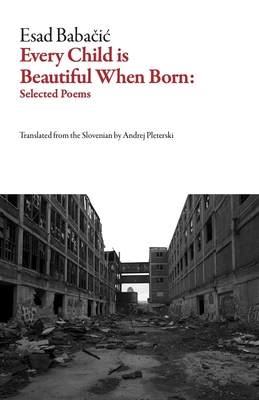 Every Child Is Beautiful When Born: Selected Poems
Every Child Is Beautiful When Born: Selected Poems
Esad Babacic / Andrej Pleterski
Dalkey Archive
This well-arranged (as opposed to chronological) sequence of poems from across decades of Babacic’s (b. 1965) published works in Slovenia marks the poet’s first anthology published in English, highlighting themes that have remained consistent obsessions over time.
The shorter pieces are epigramic, usually only a single sentence / stanza, often beginning with the phrase “Sometimes you,” such as the Bukowski-like “Sometimes you go all the way / even if you’ve lost your way” and “Sometimes / you clench / the fist / in which / you’d bring / flowers.” (Cf. Bukowski’s “You Get So Alone at Times That It Just Makes Sense.”)
The topics often cover some variation on the theme of alienation from a culture that embraces faceless, mechanical impersonalism in exchange for access to cash. For instance, “A Green Land” begins like this:
There’s a manic
depression of economy,
a psychosis of taking away
heartlessly,
a manic depression
of constructive engineering,
a depression of graves
never in short supply.
The opening to “The Body Scent” reads like an Eastern European cross between Rainier Fassbinder and Simon Hanselmann’s Megg and Owl:
The sun has risen above the Golovec and breathed through
my room.
The state would call it the sun of freedom. With slow and
drowsy gestures
I crawl toward my pants, thinking whether I should eat today
or get fucked-up.
Babacic writes the kind of poetry people who usually don’t like poetry like: The words are familiar, the images direct and concrete, and writer’s life is also one in which diligence and decency have few rewards.
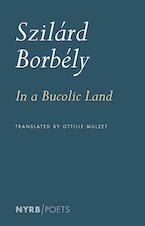 In a Bucolic Land
In a Bucolic Land
Szilárd Borbély
NYRB Poets
Szilárd Borbély’s In a Bucolic Land describes growing up impoverished in Hungary during the ‘60s and ‘70s as a member of a despised religious minority among despised minorities living under the thumb of atheist Soviet Union. The “bucolic” of the book’s title is ironic not elegiac—Nature is as brutal and unsympathetic as parents toward their children and the community at large toward each other as everyone struggles to exist at mere subsistence-level.
Borbély names as “the gods” the indifferent forces of whim and fate that seem to decide the lives and deaths of people toiling to get by. This is a tendency I’ve noticed among European writers unconvinced by Romantic, transcendental swooning over brooks and glens. Instead, writers I’ve recently reviewed—such as Jean Giono and Adabelt Stifter, and Inès Cagnati—illustrate the brutality needed to merely survive, where “Christianity” is a patina barely covering the avowedly pagan world the characters maneuver within.
Inès Cagnati in her novel Free Day, left an impression of poverty that has stayed with me since reading it: To send her daughter to school, where she has won a scholarship, the mother must sacrifice the only paper bag she owns for her daughter to carry her books in. Similarly, Borbély’s bucolic setting is barely discernable from medieval conditions: Borbély’s mother dreams of a home with a wooden rather than dirt floor, a twin bed with nightstands on either side, and—most importantly as a measure of living above mere needs—a dresser-and-mirror set:
And when she finally had everything she desired, there was no point anymore. On the ground, between the left leg of the dresser and the door to the next room, was the largest pool of blood, congealed, I scraped it off with a small shovel. I only conjectured that this was my father’s blood. . .
(This is as explicit as Borbély describes the in-home attack on his parents that killed his mother and significantly wounded his father, physically and psychologically.)
“Icarus in the Housing Project” describes that urban squalor that replaced the bucolic:
The thudding sound of kittens thrown out
of the tenth-story airshaft window produced only the
faintest of echoes.
My buzzer rang after midnight, at that hour it was
the always cheerful gym teacher asking me
to let him in because his spouse and his small children were already asleep
and he could see through the light in my window I was up working. And so our
acquaintance in the urine-smelling lift began, then it continued next
to the garbage shut smelling of roach repellent
and disinfectant. I would have left, but he
held me back. Every one of his movements
begged me: Don’t leave me here.
Translator Ottilie Mulzet’s afterword clarifies and situates the personal and historical background to Borbély’s works, in addition to conjuring lucid renderings of his poems.
 Heart First into This Ruin: The Complete American Sonnets
Heart First into This Ruin: The Complete American Sonnets
Wanda Coleman
Black Sparrow Press
Originally published in sections across various of her poetry collections, Heart First into This Ruin finally collects into one volume the complete 100 American Sonnets, Coleman’s contribution to the sonnet form and the aesthetic expression of her experiences as a Black woman in America, un-degreed and unmarried—experiences simultaneously singular and familiar, unique and shared, compressed to 14 lines (the only formal element her sonnets share with traditional sonnets). The lines and stanza lengths vary from poem to poem, suggesting that Coleman tries to tailor each poem’s meter to its subject, the way it is talked about, described. And this she does very well, covering family, erotic love, work, chronic poverty, racism, and the damned knowledge that she is better than what she receives from American society. Here’s Coleman in meditative form, “American Sonnet #76”:
there be the fog outside and the fog inside
settling over the gravesites and skin
climate fit for ghosts and amnesiacs, befogged,
intrusive skirtings thru filters, cracks
and secret spots, mist forming at my lover’s
kiss in the pretty air, the kiss hovering and diving
before it strikes me. mist oceanflow from resistance to
peace time, mist taking root in the brown chair at the
pine desk, composing, there is internal fog and external
fog. a garden of spirits and drums, sprites
thrilling on the ooze, of firs, walking naked, cold and
hungry for smoke, the east, want borne on wickedness like
a shot, or kiss, before diving into blankets and history
to embrace the fog to give it form and flesh
An essential collection of American poetry from the late 20th century.
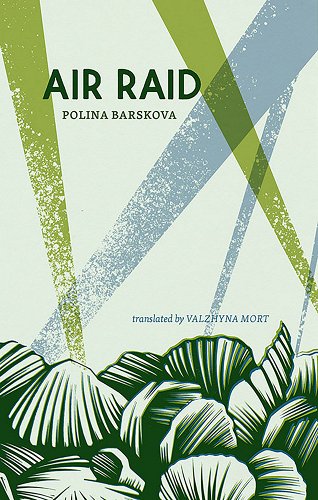 Air Raid
Air Raid
Polina Barskova
Ugly Duckling Presse
The poems of Air Raid are often built upon phrases found in documents made available to researchers after the Soviet Union’s collapse. Letters, notes, and other ephemera written either during the time of Stalinist purges or during the near 900-day siege of Leningrad. Other poems are based on archival materials from collections outside Russia.
The prelude to the poems that make up Air Raid imagines apartment residents congregating when the mail arrives, only to find the following marks on their letters:
Postmark:
“returned mail” “urn mail” urrrrrrrr
“doesn’t reside at this address” doesn’t doesn’t this
“unable to deliver”
DE
FRANKLY SPEAKING I’M WORRIED ABOUT YOUR SILENCE
Already 10 hours
Already 10 years
Already years your silence worries me
Although this poem ostensibly concerns the siege of Leningrad, would any part of it change if the topic were victims of Stalin’s purges? Whether by their own government or by Nazi forces, Soviet citizens were targets of deliberate annihilation. Here is a response to Nazi atrocities from the point of view of a Polish Jew, “Aladdin,” a poem in the cycle “Hampshire College Archive. Personae.”
A blackened milk tin
contains a letter of Israel Lichtenstein
written in the year of 1942 obviously.
Naturally, in the Warsaw Ghetto
two weeks before his departure to Treblinka.
Naturally.
The letter reads:
I accept oblivion for myself and my loved ones.
(My wife, whose name here is meaningless,
leave her here now nameless and faceless)
ready to become pearl string of teeth,
a chestnut lock in a mattress, a shadow.
Yet, we really wish
that whoever finds this letter inside a milk tin
resembles our daughter—Margalit.
Today, she turns twenty months.
O, she’s an extraordinary child!
Let me tell you, what a little talker, our Margalit!
Whether Barskova bases her poems on archival material or writes from creative empathy, she discovers places of hopeful persistence and joy, with love as the propelling force.
Bi-lingual edition with a lengthy interview of Barskova by translator Valzhyna Mort.
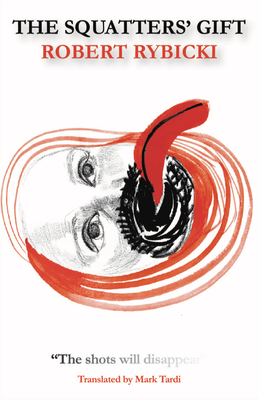 The Squatters’ Gift
The Squatters’ Gift
Robert Rybicki / Mark Tardi
Dalkey Archive
Polish poet Robert Rybicki was born in 1976, with five years of his adult life spent squatting in an abandoned apartment building:
my philosophy & logic run amok
I’m a trash man from the land o’ yuck
my sour stank keeps everyone at bay
even the squatters will turn me away
I take a detour from the trash collection
my legs decide to make an objection
I, a joyful hobo, wino
pander & gander! (from “Trash Route”)
Rybicki is not, however, a Polish Bukowski. He loves playing with language, words, and their sounds—“POETRY LESSON,” in fact, is all in transcribed or imaginary bird song, and “HAPPY DADA” is a linguistic olio. (And translator Mark Tardi certainly gets the “American” English right.)
But the seriousness behind the silliness is the urge to coax readers into actively, consciously taking in and savoring the uniqueness of the world. Part of the world’s uniqueness, of course, is embedded in oneself, and his poem “In One Moment” pretty much summarizes the attitude toward life he advocates (and which I won’t quote because spoiler alert).
Conformity and social alienation are Rybicki’s enemies: “what’s a poe’m / if it ain’t changed its author,” he asks in “JOIN & JOINT,” to which he adds in “TRASH ROUTE (RECYCLING)”
cars are cages for people
in the age of people looking away
walking away from each other more rapidly
The age of looking away, of not wanting to engage with others or the empathy that follows, of ignoring other possibilities that experiential knowledge allows. For Rybicki, knowledge “is our consciousness / set aglow by imagination.”
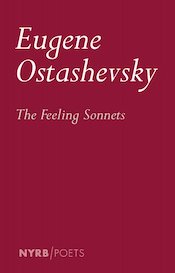 The Feeling Sonnets
The Feeling Sonnets
Eugene Ostashevsky
NYRB Poets
Eugene Ostashevsky—poet, translator and anthologist of modern Russian writers—was born in Leningrad (St. Petersburg now, again) but moved with his parents to the U.S., learning English, one would gather from his own works, based on word play and puns. The word play permeating The Feeling Sonnets exists less to arouse a sense the ironic and more to draw out the multiple meanings a single word may have, depending on context, as well as ancillary semantic echoes in punning homophones. The comedic and tragic live together—the two are inseparable, perhaps unhappily—and yet here they are, Groucho Marx and Gertrude Stein, demonstrating the permutations that even the most basic vocabulary is subject to about the vagaries of life, what poetry tries to do, and fatherhood.
Here are two excerpts from “The Fooling Sonnets,” the first on music, the second on capitalism, world trade, and national hierarchies:
If Errato is the muse of poetry, who is the music of music.
No muse is the muse of music. Any muse is the muse of music.
A muse is she musing about her meaning with music.
Take meaning away from musing and all that remains is music.
It is the music that makes for feeling and not the meaning. . .
A fire took place here, a conflagration.
It’s called a conflagration because it started with flags.
A flag is a mark. If there’s a mark, there’s market.
I come from the market, make dinner, and engage in struggle.
It is a struggle to get my daughters to sleep. They sleep on bunk beds.
The bunks beds are contemporary. They come from Ikea.
There were transported by trucks. My daughters are transported.
There is a herd of unicorns on the rug below them. They come from developing markets.
In markets that are already developed, philosophers say that unicorns do not exist.
There’s only one step from the remarkable to the marketable, and the unicorns have taken it.
So say the people of developing markets. But the philosophers do not hear them.
“Die Screibblockade; or, The Feeding Sonnets,” is dedicated to Polina Barskova, also from Leningrad, and a poet who moved to the U.S. with her parents, a poet to whose Living Pictures Ostashevsky has written an introduction.” The subject of “Die Screibblockade” is ostensibly writer’s block (what the title translates to in English), but in the following passage, Ostashevsky focuses on the linguistic echoes—semantic and phonic—among three European languages, their reverberations throughout modern history:
Die Siege in German is the plural of der Sieg, which means victory.
In French la siege means seat, la chair means flesh, and la fleche means arrow.
Our [i.e., Russian] siege means you pull up a chair and wait for the city to eat through its stores and then starve, achieving victory.
A few other Russian victories include the following items:
Death by fire and especially death by friendly fire.
Death by state security services, because the state is always feeling insecurity that it’s not providing enough services.
Death by rationing, a rational death, when those with less food die so that those with more food may enjoy more food.
Purging the enemy within is a hallmark of every repressive regime, especially those eager to earn bragging rights for the efficiencies of their bureaucratic rationalism in service to the greater ideology.
Eugene Ostashevsky is a sharp, intelligent writer who grasps the perniciousness of systems designed only to perpetuate themselves at the expense of others, and who can do so poetically with the systems’ own words.
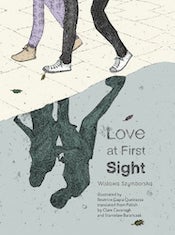 Love at First Sight
Love at First Sight
Wislawa Szymborska (Clare Cavanagh and Stanislaw Baranczak, trans.) and Beatrice Gasca Queirazza (illustrations)
Seven Stories Press
Wislawa Szymborska, who received the Nobel Prize in 1996 for her poetry, poetry remarkable for its simplicity of vocabulary—which favors concrete imagery over abstract concepts—based on seemingly unremarkable domestic activities, stated in a voice that combines gentle prodding and irony with an amiable personality. Which is not to say her poems deal with trifles and superficial emotions. “The Suicide’s Room” from 1995’s View with a Grain of Sand, for instance, is devastating.
Love at First Sight, thankfully, is about suicide’s opposite: A reason to live. Yet, when was that “first sight” that draws couples together? For those couples who have experienced it, Szymborska probes the sense of familiarity and knowing that makes the relationships immediately click into place.
Since they’d never met before, they’re sure
that there’d been nothing between them.
But what’s the word from the streets, staircases, hallways—
perhaps they’ve passed by each other a million times?
I want to ask them
if they don’t remember—
a moment face to face
in some revolving door?
perhaps a “sorry” muttered in a crowd?
a curt “wrong number” caught in the receiver?—
Szymborska’s narrator is sure that the bond a couple experiences at the outset of their romance had an origin, but a repeatable and eternal origin:
Every beginning
is only a sequel, after all,
and the book of events
is always open halfway through.
This notion explains why the people in Beatrice Gasca Queirazza’s illustrations represent a variety of ages: First sight doesn’t have to mean in the blush of youth, and if, due to mortality, one love dies, another love, as rich and enriching as its predecessor, is already in development for the sequel.
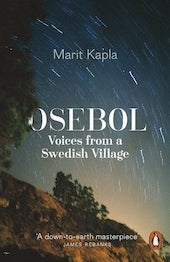 Osebol: Voices from a Swedish Village
Osebol: Voices from a Swedish Village
Marit Kapla / Peter Graves
Allan Lane
Osebol is a small, river-side town in the middle of Sweden amid forests. The town’s industries used to be timber cutting and chipboard manufacturing, but over the decades the industries have died, jobs and people moved elsewhere, and the few children whose parent’s live there must be sent to other cities for their education. Several years ago, Marit Kapla interviewed the handful of people who still live in Osebol, who recount their lives in this little place. The words comprising Osebol are the citizens’ own, but Kapla has poetized them, breaking their sentences into lines forming short stanzas, creating a sense of paring language and image to their foundations—a technique I imagine matching Swedish terseness.
Osebol is what one might call a quiet book—the lives and actions described here are unassuming but of huge significance for those persons enmeshed in them. The people and their temperaments remain constant, but technologies do not, affecting the people, their relationships to each other, and the possibilities available to those who don’t ask for much to begin with. Couples meet, marry, and work here (or used to). One townsman, Åke Axelsson (b. 1947), recalls when his wife, Annika (b. 1959), developed cancer, which he manages to see as higher type of good:
But it was good, too
in that it reminded me
I still loved her.
I’d forgotten that.
That’s how things are.
If everything
is just good, good, good
in the end you stop remembering
how good your life is.
It does you good sometimes
to get a slap in the face
so you wake up and realise
just how bloody good your life is.
The book’s chapters are divided by speaker, with each person’s name listed at the bottom of the page, along with birth and sometimes death dates. Above is their testimony, one incident per page. Osebol’s emotional effect is cumulative rather than specific to key incidents in the town’s history, including WWII and the loss of industry. The place and people are one, and our understanding of both comes as we read the stories and facts that span decades, families, couples, and individuals: multiple points of view from multiple points in time.
Here’s Lars Jörlén (1946-2021) on Osebol’s sense of community as an extension of love, caring, and responsibility:
We had some pupils
we went and fetched in the morning.
Their parents couldn’t get them to go to school.
It wasn’t our job
but people took it on.
We took the view
or tried to take it
that all children are everyone’s children.
Even if they have parents of their own
they are still the children of society as a whole.
I think
that’s a good basic outlook.
The economic loss to Osebol over the decades from changes in manufacturing processes has not affected everyone equally, however. As Jörlén goes on to note,
Segregation is extremely marked.
Those who own the forest
and have money
usually grandparents on the mother’s or father’s side
obviously their kid
needs a scooter.
So they go and buy one, cash down
pull out their fat wallet
and count out twenty-five, thirty . . .
It costs forty-five
Right, OK . . .
thousand.
And off they go home
with a scooter or quadbike
while the rest just stand and watch.
The class divisions I encountered
when I came here were enormous.
Most of the townspeople offer assessments more generous than that—at least for the record, as here. There are accounts by refugees from WWII who came here, liked it, and stayed. Anything less than a 100 years’ residency marks in Osebol a person as alien—but generally accepted, and the “outsiders” are still able to enjoy their lives untroubled by xenophobes, and appreciate the Osebol families that took them in.
Nothing sentimental is expressed by this book or Osebol’s town folk. It forms a steady, sympathetic gaze at what has been lost and at what expense. Neo-liberal capitalism probably only accelerated Osebol’s decline. (Trees felled in the surrounding forests are sent overseas for processing, where the work can be done less expensively than at home.) Expressed here are experiences and emotions that are no doubt emerging in other isolated parts of the industrialized First World where populations are aging and declining.
I walk up to a viewpoint.
There’s a rock there
I sit on
and give my dog Grace
a biscuit.
I’ve been there in all kinds of situations.
When I’m in a good mood.
When I’m angry.
When I’m sad and weepy.
When I’ve been really ill.
I want to look out over the whole valley.
The Klarälven river.
In the snow.
I’ve sat up there in the snow.
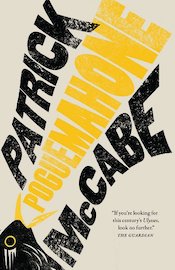 Poguemahone
Poguemahone
Patrick McCabe
Biblioasis
A 600-page narrative poem reading like a novel about Una and Dan Fogarty, children of the unwed Dots Fogarty, a suicide, raised in an Irish orphanage / foster care system that seems to blend the worst aspects of juvenile prison with factory work. But the book mainly focuses on their later lives, in the early ‘70s, when Una is in her 20s and free of the orphanage, living for the summer in a hippie squatter commune where—among the dope, liquor, acid, and changing personnel—she falls in love with one Troy McClory, a college-semester drop-out and Ian Hunter / Mott the Hoople acolyte, who gives her the attention she otherwise never received or receives—even if this means he occasionally beats her.
Dan Fogarty narrates the story, the broken lines on the page capturing the cadence of his speech (blank verse, no ABAB here). But as the narrative goes on, certain facets of the Dan-POV don’t quite add up until, about mid-way through the book one’s hunches are confirmed (spoiler alert) that Dan is actually a gruagach, an Irish sprite that is invisible and unheard (to all but Una), with poltergeist-like abilities to move objects—such as pushing out the window a competitor for her Troy’s amorous attentions. A gruagach embodies a soul—Dan’s case his soul was limited to the few drops of blood that dripped from his mother’s uterus after a botched abortion, while she hanged herself from the rafters.
Traditional Irish folklore would say that Dan was a gruagach who put bad ideas into his sister’s head, just as Una claimed; whereas modern medicine would say she’s schizophrenic. Dan himself claims to suffer from “inmí,” an Irish term for depression and anxiety, which often results in violent drunkenness. “Poguemahone” is another Irish term, meaning “kiss my arse,” which suggests something about the book’s narrative tone. Some of Dan’s physical nastiness is directed to those who debase his sister, who, on top of being dim and delusional, is also obese, which attracts to herself unkind attention that mere dim and delusional do not.
When the book opens, circa 2019, Una is 70 with dementia and in a housing facility that can meet her needs. Like it or not. This is the medias res the narrative returns to during the book’s final hundred pages, as Una prepares her final stage production, just as she had in the days with Troy and Dan. As with her stage productions of the ‘70s at the Mahavishnu Temple, the emphasis is on the verb “prepare.”
Poguemahone, for all its comic moments, is more seriously about the tensions between traditional and modern ways, memory and vengeance, and British / Irish power dynamics.
